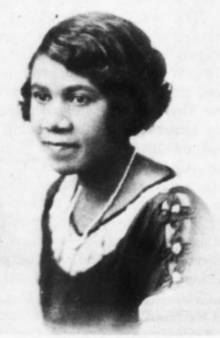Myrtle Smith Livingston
Myrtle Smith Livingston (May 8, 1902 – July 15, 1974) was an American educator and playwright.
Early life[edit]
Myrtle Athleen Smith was born in Holly Grove, Arkansas, in 1902, the daughter of Isaac Samuel Smith and Lulu C. Hall Smith. She graduated from high school in 1920. She studied pharmacy at Howard University for two years (1920-1922), and earned a Colorado teaching certificate in 1924.[1][2][3][4] She later earned a master's degree in 1940, from Columbia University.[5]
Career[edit]
Livingston taught physical education at Lincoln University in Missouri,[6] beginning in 1928. She created many of the school's athletic opportunities for women students, including organized team sports.[4] In 1936, she founded a dance program at Lincoln, the Orchesis Group.[7][4] During World War II, she taught first aid classes in the community.[8] She retired from Lincoln University in 1972.[4][9]
Livingston wrote For Unborn Children, a short play about interracial marriage and lynching.[10][11] In 1926, it won a prize in the Spingarn competition sponsored by The Crisis magazine.[2] It was the first play published in The Crisis.[5] In 1951, the play became the basis of an opera, The Barrier, by Jan Meyerowitz.[12] "Although controversial in nature, the play presents a forum for discussing an issue that continues to haunt our society," note the editors of a recent complication of African-American dramas.[10] She wrote another short play, Frances.[5]
Personal life[edit]
Myrtle A. Smith married William McKinley Livingston, a doctor, in 1925.[13] She died in 1974, in Hawaii, aged 72 years.[4] There is a Myrtle Smith Livingston Park, with tennis courts, on the campus of Lincoln University.[8][14]
References[edit]
- ^ "Letter from Myrtle A. Smith Livingston to W. E. B. Du Bois, December 12, 1925". W. E. B. Du Bois Papers, Special Collections and University Archives, University of Massachusetts Amherst Libraries. Retrieved 2020-06-05.
- ^ a b Omodele, Remi (2002-03-01). "'For us, about us, near us and by us': American women playwrights and the making of NAACP-Du Bois's edutainment agenda". Women's History Review. 11 (1): 49–70. doi:10.1080/09612020200200310. ISSN 0961-2025.
- ^ Hatch, James V.; Shine, Ted (1996). Black Theatre USA Revised and Expanded Edition, Vol. 1: Plays by African Americans From 1847 to Today. Simon and Schuster. p. 188. ISBN 978-0-684-82308-9.
- ^ a b c d e Mitchell, Koritha (2013). "Livingston, Myrtle Smith". Oxford African American Studies Center. doi:10.1093/acref/9780195301731.013.37376. ISBN 978-0-19-530173-1. Retrieved 2020-06-05.
- ^ a b c Hill, Anthony D.; Barnett, Douglas Q. (2008-12-04). Historical Dictionary of African American Theater. Scarecrow Press. p. 310. ISBN 978-0-8108-6276-0.
- ^ "Lincoln University (Missouri) Faculty -- June 1941". The Crisis: 256–257. August 1941.
- ^ "Orchesis Dance Group Re-Organized". Jefferson City Lincoln University Clarion. December 20, 1940. p. 5. Retrieved June 5, 2020 – via NewspaperArchive.com.
- ^ a b Dawnson, Lana (2009-01-01). "Women of Change: Myrtle Smith Livingston". Page Library, Lincoln University.
- ^ "You're Invited". Jefferson City Lincoln University Clarion. April 28, 1972. p. 1. Retrieved June 5, 2020 – via NewspaperArchive.com.
- ^ a b Pitts-Walker, Ethel; Ervin, Kathryn (2014-06-03). African American Scenebook. Routledge. p. 25. ISBN 978-1-135-69405-0.
- ^ Stephens, Judith L. (Summer 1992). "Anti-Lynch Plays by African American Women: Race, Gender, and Social Protest in American Drama". African American Review. 26 (2): 329–339. doi:10.2307/3041860. JSTOR 3041860.
- ^ Hutchinson, George; Hutchinson, George Evelyn (2007-06-14). The Cambridge Companion to the Harlem Renaissance. Cambridge University Press. pp. 67–68. ISBN 978-0-521-67368-6.
- ^ Who's who in Colored America. Who's Who in Colored America Corporation. 1942. p. 329.
- ^ Roberts, Nicole (July 19, 2019). "Parks Department to purchase lights for Community Park splash pad". News Tribune. Retrieved 2020-06-05.
External links[edit]
- Schleer, Mark and Bryant, Ithaca, "Legendary Ladies of Lincoln: Myrtle Livingston Smith" (2019). Legendary Ladies of Lincoln. 18.

